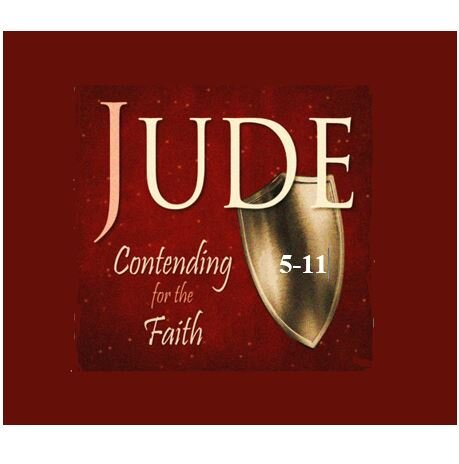BIG IDEA:
CERTAIN ETERNAL DESTRUCTION AWAITS THE APOSTATE FALSE TEACHERS WHO ARE MARKED BY LUST, REBELLION AND IRREVERENCE
INTRODUCTION:
“marked out for this condemnation” (vs.4)
I. (:5-7) THREE OT EXAMPLES OF ETERNAL DESTRUCTION OF APOSTATES
Introduction: Urgency of this reminder
“Now I desire to remind you, though you know all things once for all”
Jude repeating Peter’s warning against these false teachers
It is clear from history who is going to win this spiritual confrontation
A. Example of Unbelieving Israelites Despite Deliverance From Egypt – Emphasis on root problem of Unbelief
“that the Lord, after saving a people out of the land of Egypt, subsequently destroyed those who did not believe.”
B. Example of Rebellious Angels – Emphasis on rejecting authority and reviling angelic majesties
“And angels who did not keep their own domain, but abandoned their proper abode, He has kept in eternal bonds under darkness for the judgment of the great day.”
Stedman: His point is that even angels are not excluded from judgment, when they fall through pride and lust.
C. Example of Depravity of Sodom and Gomorrah – Emphasis on defiling the flesh
“Just as Sodom and Gomorrah and the cities around them, since they in the same way as these indulged in gross immorality and went after strange flesh, are exhibited as an example, in undergoing the punishment of eternal fire.”
II. (:8) THREE DAMNING CHARACTERISTICS OF THIS CURRENT CROP OF APOSTATES
Connection to OT Examples:
“Yet in the same manner these men, also by dreaming”
Wiersbe: The cause of their rebellion is found in the word dreamers (v. 8).. These people live in a dreamworld of unreality and delusion. They believe Satan’s lie, “Ye shall be as gods” (Gen. 3:5). Having turned away from God’s truth, they feed their minds on false doctrine that inflates their egos and encourages their rebellion.
Green: he may simply be referring to their voluptuous dreams . . . Or he may mean that they are dead to decency, sunk in the torpor of sin . . . But as the word occurs elsewhere in the New Testament only in Acts ii. 17, where it is used of prophetic dreams (cf. Joel ii. 28), it probably indicates that the false teachers supported their antinomianism by laying claim to divine revelations in their dreams.
Coffman: Any, or all, of a number of things could have been meant by this. “Idle speculations,” F28 impractical and unrealistic thoughts, “certain visions they had received,” F29 divine revelations they claimed to have had, or simply that, “their thoughts, whether awake or asleep, were impure, sensual, evil.” F30 Whatever the exact meaning, all of their activity was directed to a single objective, that of defilement, whether self-pollution, or the corruption of others, or both.
A. Marked by Lust
“defile the flesh”
B. Marked by Rebellion
“reject authority”
C. Marked by Irreverence
“revile angelic majesties”
III. (:9-10) UTTER PRESUMPTION AND FOLLY OF REJECTING ANY CONCEPT OF THE FEAR OF THE LORD
A. (:9) Presumption of Assuming the Role of Executing Vengeance
“But Michael the archangel, when he disputed with the devil and argued about the body of Moses, did not dare pronounce against him a railing judgment, but said, ‘The Lord rebuke you.’”
Stedman: Jude’s argument is, if archangels, who have so much power and knowledge of truth, are careful to respect the God-given dignity of a fallen angel, then why should we, mere men, speak contemptuously of the principalities and the powers in high places? It is a thing to think about, isn’t it, when certain people today just sneer at the idea that the scriptures present the existence of demons or Satan.
B. (:10) Folly of Rejecting any Concept of the Fear of the Lord
“But these men revile the things which they do not understand; and the things which they know by instinct, like unreasoning animals, by these things they are destroyed.”
IV. (:11) THREE OT EXAMPLES OF BIG-TIME REBELLION AND CERTAIN DOOM
Blast of Condemnation: “Woe to them!”
Wiersbe: illustrates the enormity of their rebellion and sin
A. Example of Cain – Choosing Prideful Works over Faith . . . and Murder over Love
“For they have gone the way of Cain”
Stedman: He speaks of “the way of Cain,” which was essentially selfishness. Cain stands forever as the man who thought only of himself, who had no concern or love for his brother, but put him to death. He looked out only for his own welfare, and Jude says that is the first step on the way to ultimate rebellion — selfishness.
Wiersbe: the way of religion without faith
B. Example of Balaam – Merchandising the Prophetic Gift
“and for pay they have rushed headlong into the error of Balaam”
Stedman: In return for money, Balaam taught the children of Israel how to sin, (Num 31:15). He sent the pagan women among the camp to seduce the men of Israel sexually, as well as to introduce them to the worship of idols, which involved sexual rites. Thus, he became guilty of teaching others to sin. That is the error of Balaam.
C. Example of Korah – Rebelling Against God’s Appointed Authorities
“and perished in the rebellion of Korah”

